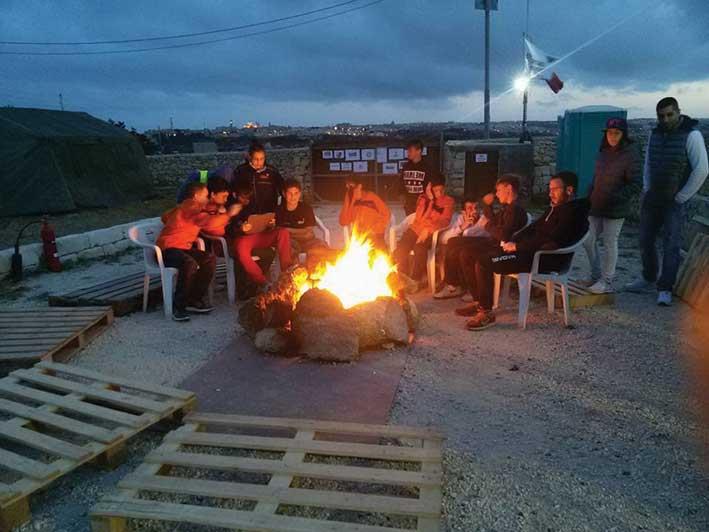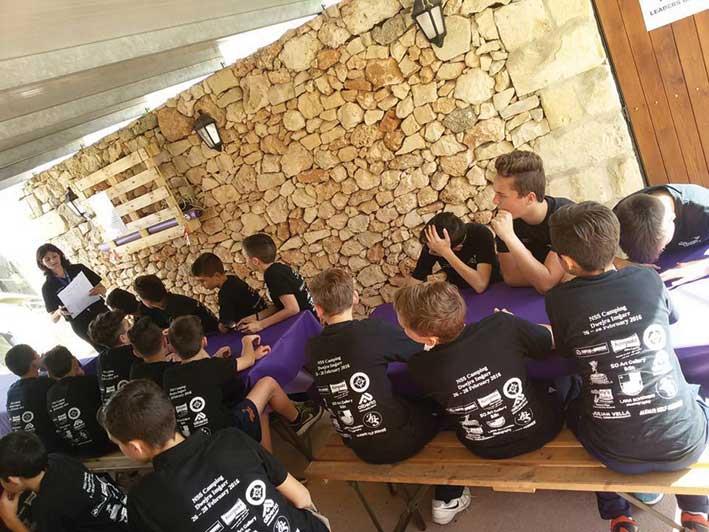Picture this situation: a peaceful home, a child watching his favourite TV programme, his elder sister chatting on her tablet while the parents are busy continuing some work they brought home from the office. What do these three activities have in common apart from silence? All three are happening indoors and are consistent with current research which shows that children are spending more and more of their free time indoors.

There are three main reasons. The first is lack of time with parents whose busy schedule means that their work now overflows into the weekend. Second is the daily increase in time spent using technology and gadgets and which is turning our children's active free time into sedentary time. Third is the issue of safety where we find parents who are anxious if their child ventures slightly beyond his / her comfort zone and shows interest in exploring an unknown area or engaging in a new physical activity.
Throughout the scholastic year, schools now organise activities aimed at making time outdoors part of their pupils' and students' lives. Outdoor Education is one of the main areas covered in the physical education curricula around the world, including Malta. Outdoor Education includes activities such as trekking, abseiling, tent pitching, orienteering and climbing, to mention just a few.
One such recent educational activity was a three-day camp organised for a group of pupils at the National Sports School. The purpose was for the pupils to explore and experience life outdoors, understanding how time out can help their holistic development.
When one thinks of child development what comes to mind is their physical development. We tend to forget that outdoors is a human being's natural environment. It provides the space to experience a sense of freedom you cannot feel indoors.

We set up camp in a field at Dwejra, close to Mgarr, in an open and natural environment where the students could roam about safely. Some activities were organised, but there was time and plenty of space for them to split up into smaller groups and do their own thing.
Traditional camping games drew the group together and long walks tested their stamina. At times, parents avoid long walks with their children, brushing the thought away with excuses of fatigue or boredom. But that means the children miss out on the chance to discover the countryside for themselves. It also means they miss out on their physical development. Exploratory walks help children make full use of their senses, to appreciate the environment and to learn how to take decisions quickly for themselves and the other members of their group.
Outdoor Education has two aims: enjoyment and learning. To make the most of the Dwejra camping trip, the school organisers teamed up with private companies who helped out enthusiastically. Teamwork is crucial in group activity, and more so outdoors. Setting up camp and sorting out the sleeping arrangements called for careful planning. It all paid off as the students not only learned how to pitch a tent, but also had to learn how to share a new space with others so that everyone felt part of the adventure. Learning to share is part of Outdoor Education, so chores were divided among the students. The lesson there was that when the burden of work is divided, it all becomes easier for everyone and it can even be fun.
Being in an open space, without the rigid boundaries of a school building, enables more social interaction, helping students to develop their social skills. In Outdoor Education, the purpose of organised activities is to enhance team work. At the Dwejra camp, for instance, the students had a sculpture session where they had split up into groups who had to form a sculpture using natural materials they found in their surroundings, such as stones, soil, twigs and leaves. Was there any point to this? Yes. Creative group work is relaxing and generates a sense of wellbeing, as the students commented afterwards
Learning new skills in an unconventional environment is refreshing and stimulating. The unusual combination of, say, learning Karate skills together in an environment far removed from the traditional Dojo is part of Outdoor Education, making the most of physical activity in natural light, in a wide open space under an open sky and with clean, spring air all around.

Educators know that although not all students learn in the same way, the more they enjoy an activity, the more they will learn. So, in a literacy session with a difference students huddled round a camp-fire for a story-telling session quite unlike the dull experience of studying alone at a desk. The purpose was to show how books, when they are read with passion, can lead you to undiscovered worlds and provide moments of enjoyment. Couldn't a story-telling session be held in class? It obviously could, but the outcome wouldn't be the same.
Not least, Outdoor Education teaches respect for the environment. Living close to nature helps one appreciate its beauty. Unfortunately, in this country, space is at a premium and open spaces are decreasing every day. Younger generations will have fewer and fewer opportunities to feel the freedom of being outdoors and to listen to the sound of nature.
During this camping trip, the students were encouraged to understand how we should protect our natural environment and were also given practical tips on how they make a difference through their attitude within their families and at school. Students were briefed on how to make use of the different waste bins provided on site and were also encouraged to avoid wasting food and water.
There is an impressive amount of international research that highlights the importance of students experiencing life outdoors. Some fairly recent research shows that children who spend time outdoors become more independent. Living and sleeping outdoors means making do without some of the usual comforts of home, which helps children become resourceful as they have to learn how to think about what to do, how to adapt to their environment and how to take appropriate decisions at the right time.
This three-day camping trip aimed to tick all those boxes. It did that and more, helping the holistic development of students who spent a few days away from their families and among their peers. That's the point of Outdoor Education. It makes learning fun, leaving participants with great memories of an enjoyable life experience.
The National Sports School would like to thank the following for their priceless help throughout the organisation of the camp: Sergeant Mark and Mrs. Carmen Camilleri, Fontanella, Surplus Adventure, Joe Bonnici & Sons, Alberta, Mediterranean Ceramics, Kompakt Trading, Anthony's Bakery, Jesper, Aquatess, Malta Archery Association, Malta Karate Federation, SO Galerie, Lara Schembri Photography and Julian Vella Aerial Cinematography.